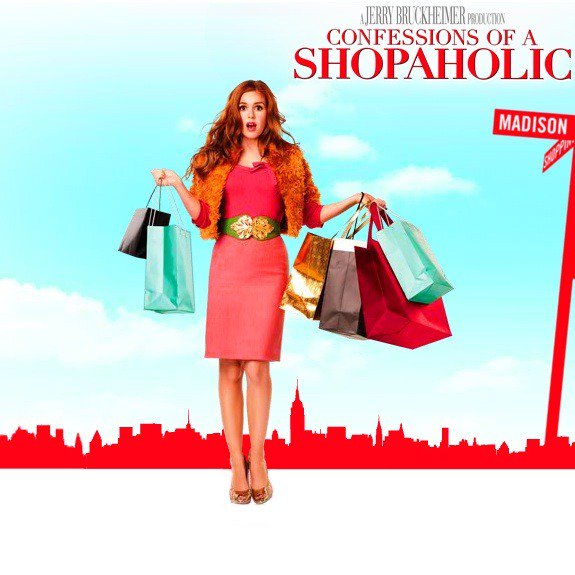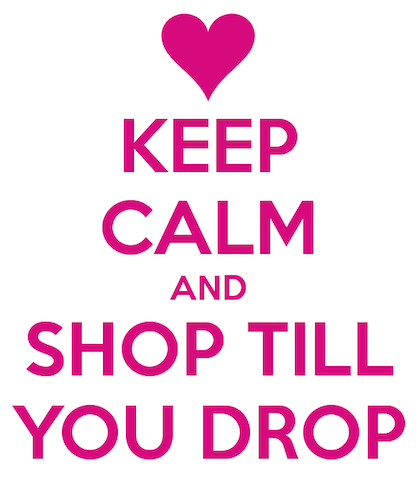Shopping addiction is a real disorder that can destroy someone’s life. It is not a joke.
Emma and Katie are strolling through Westfield shopping centre, the social hub of their local Eastern suburbs area.
The girls laugh, shopping bags swinging from their hands as they skip through the crowds, down the foyer of shopping outlets.
“I think I am a shopaholic,” Emma says.
Katie throws her head back and laughs and the girls continue walking.
The fact is, the confession wasn’t meant to be funny. It was true.
Oniomania, also known as Compulsive Buying Disorder (CBD) is an obsession with shopping and buying behaviour that causes adverse consequences.
According to the Encyclopedia of Behavioral Neuroscience, it is characterised by repetitive, excessive purchasing and results in mental, social, occupational, financial and often legal problems.
[infogram id=”compulsive-buying-disorder-1gv4m75rve90p18″]Approximately 3 million Australians are compulsive shoppers and society’s first reaction is to laugh.
In fact, it is found so humorous amongst society, experts have even labelled the condition the “smiled upon disorder.”
“We call it the ‘smiled upon addiction’, its consumption fuels our economy” – Compulsive Buying Behaviour Expert, Dr. April Lane Benson, Ph.D., author of To Buy or Not to Buy, NY.
Smiling about over-shopping is a norm.
This scene between Emma and Katie is not new. Smiling about shopping addiction is not new.
What Katie doesn’t know, is that when Emma goes home she hides her bundle of shopping bags, in fear of being caught out by her parents.
Shopping Addiction Counsellor, Michelle Laving says it has become habitual amongst society to laugh dismissively about overspending and throw around the term ‘shopaholic.’
“Sometimes people can joke and shopping behavioural problems are not taken seriously.”
“You’ll see stuff in the media like ‘shop til you drop’ which normalises the issue and makes it very hard for people to realise whether they’ve got a problem.”
The problem is most people are partying at the top of the shopping centre car park, shouting ‘woohoo’ when they hear the terms ‘shopping spree’, ‘shop till you drop’ and ‘shopaholics.’
Shopping is perceived as glamorous and Isla Fischer prancing around in US blockbuster ‘Confessions of a Shopaholic’ doesn’t help the case.
Despite its allure and these terms glazing billboards and magazine covers, there is actually nothing ‘fancy’ or ‘funny’ about shopping addiction.
Western society is yet to learn it seems, that compulsive buying can destroy someone’s life and there’s nothing funny about that.
Like Emma and Katie, most people toddle through stores every week; some shop everyday, but there is one person who did not shop for a whole year.
Conscious shopping advocate and reformed over-spender, Jill Chivers went 365 days without clothes shopping.
For a whole year, Jill did not step foot in a single store and ever since, she has become a nation-renowned advocate, open to sharing her story.
Jill was shopping overseas at the time, about to buy her fourth almost duplicate item, when she realised she had a problem.
“It was really one of those inside jobs where I had this light-bulb go off and thought ‘wow I’m about to buy something that is almost identical to three other pieces of clothing I own – exactly like it,” she says.
“That really was my stop in my tracks kind of moment.”

Buying multiple, similar items could be a sign of CBD.
Symptoms of Compulsive Buying Disorder can include thinking excessively about shopping, anxiety, feeling euphoria after a purchase and experiencing shame or guilt post-purchase.
World-renown Compulsive Buying Behaviour Expert, Dr. April Lane Benson says there are four warning signs to be aware of:
1. Using shopping as a “quick fix” for the blues
2. If shopping is your all-purpose mood changer
3. Foregoing relationships and contact with people
4. Investing great amounts of time and energy into shopping
Experts say diagnosis of CBD can be difficult. Unlike other addictions, shopping is unavoidable. At some point, you have to do it, which makes the disorder even more complex.
“Because shopping is something that we all do, sometimes it’s hard for someone to be able to tell where the line is. Whether they’ve just splurged on something, or if it is more serious and they find themselves not being able to stop,” Michelle says.
But Jill was determined to overcome her over-spending.
“My shopping wasn’t where I wanted it to be, it was out of balance. I had too much and I was wearing too little,” she says.
“I thought ok, I’m going to do this.”
But the laughter didn’t stop. In a way it is hard to fathom – you wouldn’t laugh at someone with a drug or alcohol addiction, a gambling problem or an eating disorder.
It was like a never-ending cycle of knock-knock jokes and every time someone replied to ‘who’s there’ with ‘shopping’ an unstoppable cackle erupted.
“The last thing you need is people laughing at you … what you need is for people to be supportive, to listen and be there for you and I think a lot of people with shopping issues fear that they will not get that,” Jill says.
“Gambling now is a recognised issue and if somebody publicly admits that they have a gambling issue we don’t expect there to be sniggering in response to that admission.”
Stigma
With the laughter comes stigma; the core reason being, people don’t believe compulsive buying is a real problem.
There is this façade that ‘shopaholics’ only exist in movies, or on Rodeo Drive in Beverly Hills.

Society’s cop out is to laugh it off, rather than face it head on.
“It is a collective issue and an emotional issue that has yet to reach any sort of action or level of understanding, let alone acceptance,” Jill says.
“I’ve had women do my program that say ‘you are the only person on the face of the earth I have told that I have a shopping problem.’”
“That word shame – is one of the reasons people aren’t prepared to talk about it.”
But the future of buyer behaviours could be very different.
In 2007, Jill featured on Sunrise as an advocate for conscious shopping, aiming to increase awareness and silent the sniggers received upon the ‘smiled upon’ disorder.
She mentioned shopping warnings, similar to the ‘Gamble Responsibly’ signs displayed in gambling venues, should be implemented in all retail stores.
The reminder to ‘Shop Responsibly’ would help shoppers monitor their buying behaviour.
But Sunrise TV anchor Melissa Doyle thought the idea was ludicrous and at the time, laughed it off.
“I remember Mel exclaiming ‘are you serious?’ And I said ‘yes, I am absolutely seriously!’”
But then again, there are warning signs for gambling, tobacco, alcohol and drug addictions.
According to Michelle, while ‘Shop Responsibly’ signs would be a “responsible” initiative, the prevalence of neuro-marketing tactics in commercialism means society is heading down a very different route.
Online retail sites are swamped with marketing tools, including banners, advertisements and pop-up ads designed to reel people in to their digital store.
“The inducement to spend is more in your face than ever before,” she says.
Even people who aren’t shopping online are at risk with internet cookies tracking their movements and interests, which then signal click-bait shopping ads to appear.
Online shopping has become a marketing zoo.
The animals are the cleverly crafted ads.
“Marketing tactics will keep you thinking about an item, I think we’re going to the other end of the extreme.”
What marketing companies don’t realise is that these psychologically powered campaigns, billboards and ads saturated in everyone’s lives are attacking vulnerable people.
But the seriousness behind compulsive buying is masked by the laughter and smiles that come with its confession.
“We are surrounded by really intelligently crafted, expensively put together messages that manipulate our emotions … that really puts a consumer in an incredibly vulnerable position,” Jill shares.
“There are a lot of sales people trained to exploit vulnerability and encourage you to buy more.”
With the 24/7 nature of the internet and the availability of online shopping, the temptation to buy is greater than ever before.
[infogram id=”shop-till-you-drop-1gk8pdq4e0gv2q0″]Shoppers can buy anywhere. Whether it’s in their pyjamas in the comfort of their own home, whilst commuting, or even up in the air.
Payments systems such as PayPal can process your purchase within seconds, a sweet danger for compulsive buyers.
“It’s as easy as clicking a button with PayPal, so sometimes people don’t even realise they are overspending, as the action of buying is so little,” Michelle says.
“You can spend hours browsing online, put it away, come back and there will be pop-ups and marketing for the items you have searched, reminding you to purchase them, with signs saying ‘don’t miss out’.”

People can shop 24/7.
While it’s up to consumers to ‘shop responsibly’ marketing companies are perceived as the main instigators, plowing into the psychiatric and mental health of their consumers.
“I fully support the idea of marketers and merchandisers taking more responsibility on their side,” Jill says.
Meanwhile credit card companies are the culprits for dangling ‘easy access’ loans.
“They need to take more responsibility, or having warnings in terms of spend within your needs,” Michelle explains.
“Shopping addiction is going to take many more years to be taken seriously.”
The Shopping Drug
But the urge to shop often has nothing to with the actual item the shopper is buying.
It’s not simply about buying another pair of black boots.
It’s about the feeling the buyer gets from the purchase, known as the ‘buy high.’
The ‘high’ is similar to the euphoria which substance addicts experience. But compulsive shoppers crave the high of purchasing an item, rather than the item itself.
The act of swiping a credit card or grabbing cash out of a wallet ignites a sense of euphoria, which later follows shame and isolation.
“It is similar to a drug addiction, but different in that no one ever has to take a drug, that’s why it is known as a behavioural addiction ” Dr. Benson says.
To this day, Jill remains cautious and aware of her emotions around shopping items.
We’ve all felt it before – that pull towards a particular item.
To some people, it almost feels like they’re being tugged by a string – drawn to a product. Reeled towards it like a fish on a rod.
“Everyone experiences the ‘buy high’, everybody has a little increase in adrenaline,” she says.
“I can certainly relate to the ‘oh I love it, I must buy it’.”
Mental Illness
Like substance abuse, compulsive shopping is commonly linked to mental illness. Experts say mental illness can trigger the behavioural addiction.
“For some people it is a manifestation of a mental illness,” Dr. Benson says.
According to Dr Benson there are a number of reasons for CBD:
- Emotional and personal, such as feelings of depression, anxiety, guilt and shame.
- Interpersonal, which could include unresolved issues or a fight with a loved one.
- Situational, certain events such as a holiday or birthday.
- Physiological, feeling chronic physical pain.
Over-shopping acts as a drug to soothe the pain momentarily.
“They get an immediate high and forget about the pain briefly.”

The blend of mental illness and CBD means it is even more difficult for people to come out, admit they have a problem and seek help.
“Mental illness is stigmatised, a lot of people are frightened of that” Jill says.
“It can affect your career, your public record, you’re going to be painted with that particular brush.”
Society and workplaces often ramble on about how they don’t place judgement on those who have experienced, or are experiencing mental illness.
But the sad truth is, society makes it is hard to un-paint. And even if you do, there will always be a slight streak, a small mark tainted on your front.
This is the stigma.
“I certainly experienced a lot of embarrassment,” Jill says.
“It’s the kind of thing that can make you want to become a hermit and never talk to anybody ever again.”
“You can just feel attacked.”
Jill learnt to tune out the negative comments and the ‘dinner party gossip chat’ she would come across online.
“From my family, the only negatives came in the form of absence of support, of someone saying … ‘I’m proud of you for coming out.’”
“I never got that and I still don’t get that.”
She agrees that for some people, the link to mental illness is very much a reality.
For many, shopping acts as a painkiller – a buffer between the pain and themselves.
“Shopping fulfils an emotional need that is unaddressed,” she says.
“I don’t think that it’s possible to shop too much and have that not intrude.”
“If you were to take the shopping addiction away, something will have to replace it”
But there’s a twist. Jill wasn’t over-shopping to soothe pain. Most often, she shopped to celebrate, to amplify her happiness – very different to the majority of compulsive buyers.
Her spending also wasn’t ‘through the roof’ and while other over-spenders can rack-up an overwhelming credit card debt, this wasn’t the case for Jill.
Instead, Jill was your typical bargain-hunter, sale shopper. But don’t be fooled, buying lots of inexpensive things repeatedly can be dangerous, as shoppers often fall into the trap of saying ‘but it only cost…’
“It’s common for the over-shopper to justify their purchases. Whether you’re looking at something that’s $10, $100, or $1000 dollars the driving emotion can be identical,” she says.
“I was really lucky that I never got myself into huge a credit card problem.”
“I have met women who rack-up lots of debt.”
Dangers
Michelle says shopping problems aren’t always about the price tag.
In fact, it is possible to have CBD without even spending a cent.
“You could be spending hours of your time just looking online, thinking constantly about shopping and ‘wishlisting’ items.”

Over-shopping is dangerous.
For others, over-shopping and rising credit card debt is a sad and dangerous reality.
It can destroy relationships, create financial turmoil and cause major mental health impacts.
That’s why shopping addiction experts are on the frontline, determined to wipe the ‘smile’ off the disorder’s ‘dial.’
“It can often lead to very serious consequences, including straining relationships – if you’re lying to your partner, debt and financial impacts, the person then can feel guilty and ashamed of overspending,” Michelle says.
“It can also lead to stealing – from your work, partner or family.”
The consequences go far beyond debt and could affect your entire life.
“I’ve worked with people for whom it’s been such a serious problem, that they’ve lost their job, they’ve lost their partnerships, an accounting firm, they were unable to enter their chosen profession,” Dr. Benson says.
“In the case of a lawyer, this man was not able to enter the profession because the character committee was afraid that he would co-mingle clients’ firms in order to buy compulsively.”
“It can really wreak havoc with peoples’ futures and peoples’ ability to earn a living.”
Support
Jill suggests to shop with a plan and to avoid shopping centres unless necessary.
“The best thing for me was staying out of the store,” she says.
“If you don’t see it, you can’t hanker after it. If you don’t see it, you can’t envy it. If you can’t see it, you can’t buy it.”
Other coping strategies include turning to alternative resources besides shopping. If you’re feeling depressed or isolated, instead of going shopping to fix your blues, phone a friend, write in a journal, or do an activity.
“People need to think about the underlying needs that fuel the over-shopping urge,” Dr Benson says.
“What are ways to feed those needs, like the need for love and affection, the need to belong, that will actually satisfy?”
There isn’t a ‘cure’ for CBD, but buying behaviours can be controlled through the help of support services.
“You have to learn to live with it, with some form of dignity and grace. Be in the right place in your life and that’s what I wanted to do and achieved that,” Jill says.
Despite being from opposite sides of the world, shopping addiction experts Michelle Laving and Dr Benson launched a text message program together which allows people to message in and receive support at anytime.
They aim to convey that true happiness and fulfillment comes from the non-materialistic elements of life.
“You can never get enough of what you don’t really need,” Dr Benson says.
“25 pairs of black boots are not going to make you feel more loved.”
Happiness can’t be bought.
Still funny? Didn’t think so.
Need help? Contact Shopping Addiction Counsellor, Michelle Laving:







